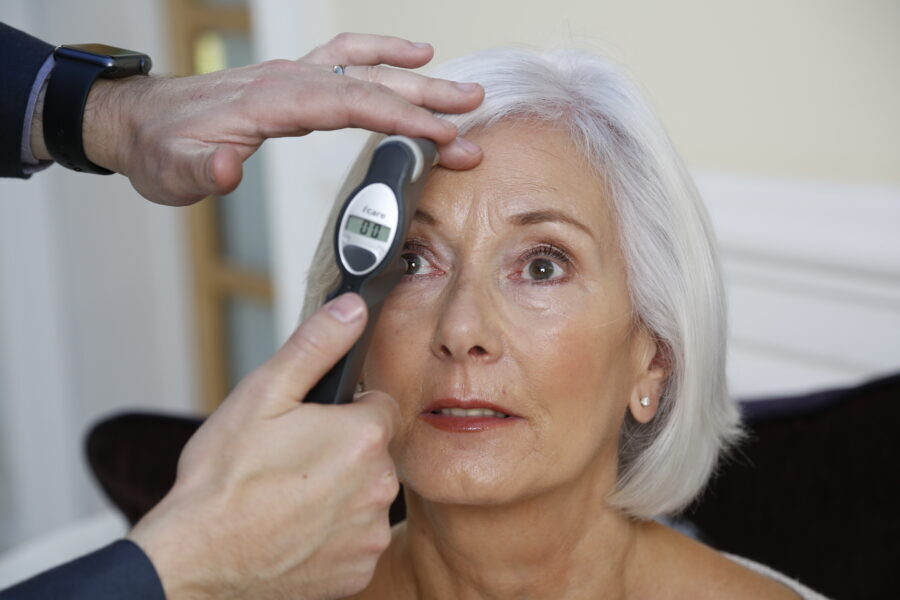Blog post
Ommetaphobia: Definition, Causes and Treatment

Matthew Burford BSc(Hons) Optometry MCOptom - Domiciliary Optician and Professional Services Manager at OutsideClinic
4/5 minutes
What is ommetaphobia?
Ommetaphobia is the intense fear of eyes. Although uncommon, ommetaphobia can significantly impact day to day life, as it affects a person’s ability to have and maintain eye contact, undergo eye tests and everyday tasks that require close attention such as putting on contact lenses or applying make-up.
Ommetaphobia can affect individuals of all ages and backgrounds. However, it is reported to be more common in children and adolescents, and is often triggered by previous trauma or anxiety.
What are the symptoms of ommetaphobia?
Individuals with ommetaphobia may experience a range of physical and psychological symptoms when confronted with eyes or even the thought of them. These symptoms include:
- Sweating
- Rapid heartbeat
- Nausea
- Avoidance behaviours, such as avoiding eye contact or skipping eye-related tasks or appointments
- Shortness of breath
How is ommetaphobia caused?
The causes of ommetaphobia are often multifaceted, arising from a combination of genetic, psychological, and environmental factors:
- Traumatic experiences, such as injuries, surgeries or witnessing eye-related incidents, are common triggers.
- A family history of anxiety or phobias may create a genetic predisposition, increasing susceptibility to developing similar fears.
- Psychological factors like social anxiety or obsessive tendencies can contribute, especially if avoidance of eye contact reinforces the fear over time.
- Cultural and spiritual beliefs, such as the concept of the "evil eye," can amplify an existing fear of eyes in some individuals.
How can you treat ommetaphobia?
Ommetaphobia can be treated using a wide variety of methods, with each often being tailored and used depending on the individual’s severity. Some options are:
Cognitive behavioural therapy (CBT): Helps individuals identify and challenge irrational fears while developing healthier coping mechanisms.
Exposure therapy: Gradual exposure to eye-related stimuli in a controlled environment to reduce the fear response over time.
Medication: Anti-anxiety medications or beta-blockers, prescribed by healthcare professionals, can help manage severe symptoms.
Mindfulness and relaxation techniques: Practices like deep breathing, meditation or progressive muscle relaxation can reduce anxiety and improve emotional control.
How are sight tests conducted with ommetaphobia?
Eye examinations can be challenging for individuals with ommetaphobia due to the nature of the tests, which often involve close proximity to or contact with the eyes. At OutsideClinic, we take several steps to reduce stress and accommodate patients’ needs:
Longer appointment times: Our opticians allocate a time period of around one hour per appointment, allowing patients to become familiar with the process and discuss their boundaries. We ensure all procedures are explained beforehand to reduce potential stress.
Enviroment: We conduct our tests in the comfort of our patients' own homes, ensuring a safe and familiar setting for them to help minimise any stress or anxiety related to the test.
Equipment: The tonometers in our portable testing kits are less invasive than standard tonometers. They are designed to minimise discomfort while ensuring accurate results.
Support: Our patients are welcomed to have a loved one accompany them throughout the visit, helping to ease any potential stress and provide additional comfort.

By Matthew Burford BSc(Hons) Optometry MCOptom - Domiciliary Optician and Professional Services Manager at OutsideClinic Post last updated 9th December 2025
Matthew graduated from Aston University in 2004 with a degree in Optometry.


